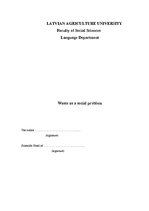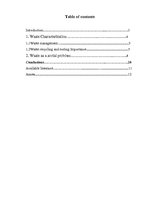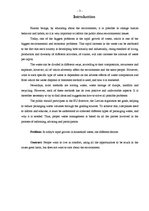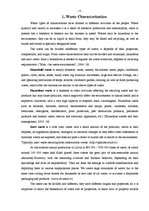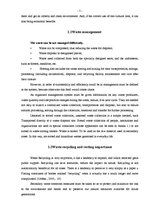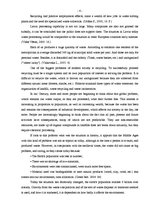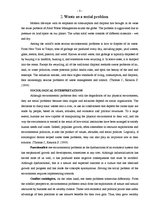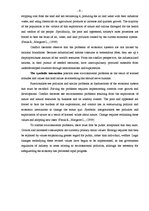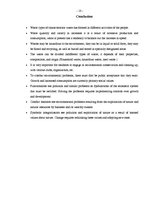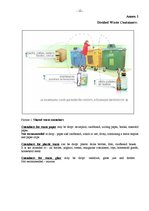-
Waste as a Social Problem
| Nr. | Sadaļas nosaukums | Lpp. |
| Introduction | 3 | |
| 1. | Waste Characterization | 4 |
| 1.1. | Waste management | 5 |
| 1.2. | Waste recycling and sorting Importance | 5 |
| 2. | Waste as a social problem | 8 |
| Conclusions | 10 | |
| Available literature | 11 | |
| Annex | 12 |
Conclusion
Waste types of characteristics waste has formed in different activities of the people.
Waste quantity and variety in increases it is a result of intensive production and consumption, while at present has a tendency to balance out the increase in speed.
Wastes may be hazardous to the environment; they can be in liquid or solid form, they may be flared and recycling, as well as buried and stored in specially designated areas.
The waste can be divided indifferent types of waste; it depends of their properties, composition, and origin (Household waste; hazardous waste; inert waste )
It is very important for residents to engage in environmental conservation and cleaning up, with various clubs, organization, etc.
To combat environmental problems, there must first be public acceptance that they exist. Growth and increased consumption are currently primary social values.
Functionalists see pollution and similar problems as dysfunctions of the economic system that must be rectified. Solving the problems requires implementing controls over growth and development.
Conflict theorists see environmental problems resulting from the exploitation of nature and natural resources by business and its wealthy owners.
Symbolic integrationists see pollution and exploitation of nature as a result of learned values about nature. Change requires rethinking these values and adopting new ones.
…
Today, one of the biggest problems is the rapid growth of waste, which is one of the biggest environmental and economic problems. This rapid increase can be attributed to the fact that each country develops itself both socially and industrially, rises standards of living, production and diversity in different activities. Problem: In today s rapid growth in household waste the different factors. Problem contrast: People want to live in comfort, using the opportunities to be much in the cause great harm, but does not want to care about the environment Functionalists see environmental problems as dysfunctions of an economic system that has emphasized growth and development, sometimes at any cost. Conflict theorists see environmental problems resulting from the exploitation of nature and natural resources by business and its wealthy owners. Symbolic integrationists see pollution and exploitation of nature as a result of learned values about nature. Change requires rethinking these values and adopting new ones.

